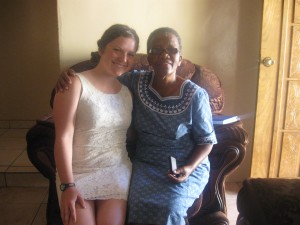Early Sunday morning, 11 other CIEE members and I climbed onto a mini-bus with our luggage and headed to a village known as Kanye. Yes! The village is actually named Kanye like Kanye West, but I am pretty sure the singer was named after the village, not the other way around. When we arrived at the education center to meet our families, we were called one by one to the front of the room to pick a little slip of paper that had our family name for the next week. I went last, and I am so glad. I got such a great family! My host mother and father are both retired; my mother was a nurse and my father worked in the x-ray department in South Africa.

There were two grandchildren who lived with us, but I just called them my host-sisters. They were seven and nine years in age and full of curiosity. They always wanted to be around me which was adorable. The family was extremely accommodating probably because they had hosted several American individuals previously including peace corps volunteers. Before I had even arrived, they had bought me corn flakes, hot chocolate, and biscuits (the Botswana equivalent to cookies). They always boiled water for my bath in the morning and made sure I had enough food.
Village life is very different than living in a city in Botswana. The water situation is especially different. In Gaborone, the water is cut sometimes but it is only once a week at most, but during the week in Kanye, there was running water for about 2 ½ days. I also think the water started making me sick, so I had to switch and strictly drink bottled water. Cooking outside was also fairly common in the village. My sister and I cooked porridge outside over a fire. I found this very fascinating because my host sister and her friends were using matches to build the fire, but none of them were over the age of 12. Situations like this and similar ones may be why many young children come to the clinic in the village with burns. One of our professors also told us, these burns might happen because the mothers are not very knowledgeable about safety precautions and may cook with children in their arms or other similar dangerous situations.
The houses in the villages were just as nice as the houses in Gaborone. An interesting fact about property in Botswana is that it is more expensive to build in the village than in the city, which seems strange though the families in the village live on compounds with multiple houses (usually other family lives there). The compound I stayed with included an Indian family who was living in the other house on the property. Most of the surrounding compounds contained relatives of my family. My mother told me the villages used to be split by who you were related to, but that is no longer the case. Overall, my village experience was great, though I think I would have a hard time adjusting to life in a village for a long period of time because of the water situation and because everything is so far apart, but I cherish this experience that I was able to have.